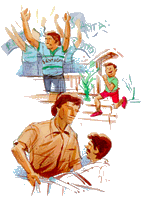

|
|
|
|
| HOME | LIFE/STYLE | COLUMNISTS | A GOOD LIFE | |||
| July 24, 1996 |
V Gangadhar
George... If I were asked to compare my passion for cricket and football,
my reply would be a Shakespearean, "Not that I loved football
less, but that I loved cricket more!"
If I were asked to compare my passion for cricket and football,
my reply would be a Shakespearean, "Not that I loved football
less, but that I loved cricket more!"
At every stage of my life, I hero-worshipped certain footballers. Growing up in Kerala and Tamil Nadu where football was highly popular, I eagerly followed the fortunes of some of my favourite soccer stars, Bangalore Blues goalkeeper, Varadaraj, Hyderabad Police outside left Moin and a group of Calcutta players, particularly Ahmed Khan, Mewalal and Venkatesh. At the international level, the tremendous Hungarians of the 1950s (Kocsis, Puskas and Hidgekuti), England's Billy Wright, Stanley Matthews and Tom Finney and the Brazilian wizards led by Pele and Garrincha enthralled me with their brilliance. I did not miss any major matches of the Sait Nagjee Amarsee football tournament (Calicut), Chakola trophy (Trichur) and the Rama Karma Cup tournament (Ernakulam). The achievements of the Kerala teams, Lucky Star and Spirited Youths, both from Cannanore, filled me with delight. Purushottaman, the star goalkeeper from Lucky Star, later played for Caltex in Bombay and covered himself with glory when his team defeated star-studded Mohun Bagan and Hyderabad Police in the Rovers Cup. Balagopal and Janardhan from Young Challengers, Calicut, switched over to Wimco, Madras, a top soccer unit in those days and helped their team to win several trophies. These men were more or less professional soccer stars and I admired them enormously. But there was one soccer player who, though not reaching such heights, was a special hero to me. He was George, the tall, big-made football captain of the Santacruz high school, Fort Cochin, where I was a student. George played centre half and was always a thorn in the flesh of our traditional rivals, St John De Britto high school. The matches between the two teams attracted huge crowds and despite putting up good fights, Britto always lost. I was among the frenzied Santacruz supporters yelling my head off, "Flying goalie up up", "Bullet Davy up up", "Captain George up up" and so on.
My father was then the deputy collector in Fort Cochin, the number one bureaucrat in the region. We lived in a huge bungalow which, formerly had been a fort under the Portuguese. The collector's post had its own trappings, including numerous peons posted at the office and the home. One of the peons, was a short, dark man named Anthony. Rather excitable, but still a very nice bloke. I was on friendly terms with all the peons and often they bowled at me while I wielded the bat in cricket practice. One evening, I found Anthony standing near the bungalow gate talking to someone who was tall and big made. I shielded my eyes against the evening sun and had a close look. The man looked familiar. I looked again and gasped in surprise. It was George, my hero and the football champion. What was he doing in our bungalow? I ran towards Anthony, but before I could reach the gate George had vanished. Anthony looked uncomfortable. "How do you know that boy?" I asked. "Wasn't that George, our school football captain?" Anthony nodded. "How did you know him? Why did he come here? What did he want?" I shot questions at him. Anthony cleared his throat. "Ejaman (master)," he began reluctantly. "George asked me not to tell you this, but I can't hide it any more. He is my brother." I reeled back in shock. The mighty George being the brother of the small-built Anthony? But I decided to have it out with Anthony. "Okay, he is your brother. But why does he keep on avoiding me in school and during soccer practice? I wanted to make friends with him. He was my hero. Did I do anything wrong?" Anthony was quiet for sometime. Then he spoke, "Ejaman, George would have liked to be friends with you. But he felt it was not possible. You are the collector's son. He is the peon's brother. So, he feels reluctant to respond to your friendship." I was then 14 and not aware of any class distinction. I did not know that friendships could be marred by such issues. My parents were true liberals and would have welcomed Anthony's brother to our home, like any other friend of mine. But George regarded the matter differently and I had to respect his wishes. Very soon, we were transferred from Fort Cochin. Nearly 35 years later, I wrote about this incident in a wellknown South Indian newspaper. Within days, I received a letter in Malayalam. It was from George! Someone had drawn his attention to the article and he wrote back saying he deeply appreciated my sentiments He too wanted to be friends with me, but the thought that I was the son of the collector and he, the brother of a peon at our home, held him back. It was some consolation to me, after 35 years, that my boyhood hero wanted to respond to my feelings. Euro Soccer 1996 brought new heroes for me. Yet, when I thought of George and how he warded off attack after attack from the Britto forwards I felt sorry he was denied the opportunities to make his name in the game both of us loved so much. Illustrations: Dominic Xavier
|
|
HOME |
NEWS |
BUSINESS |
CRICKET |
MOVIES |
CHAT
INFOTECH | TRAVEL | LIFE/STYLE | FREEDOM | FEEDBACK |
|